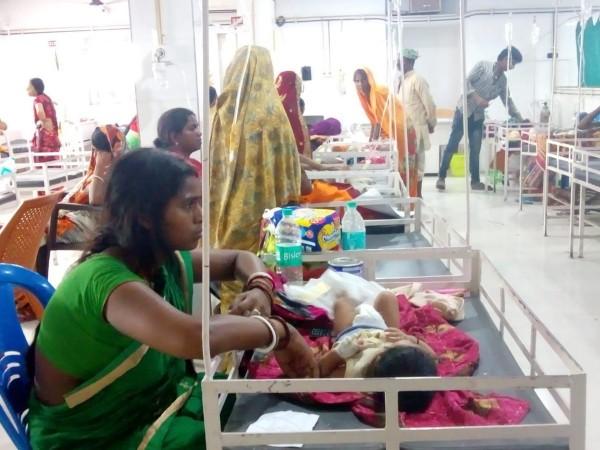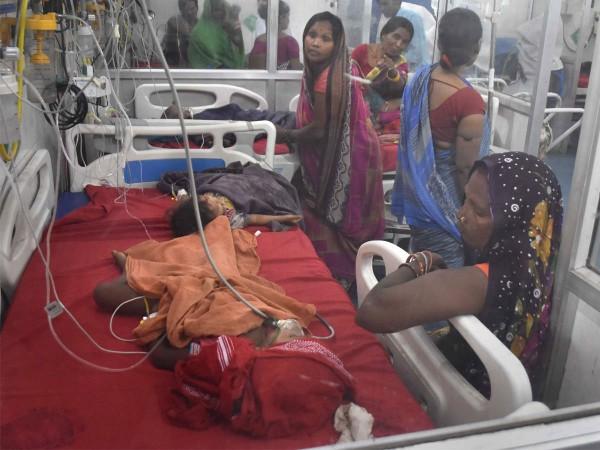
The death toll due to Acute Encephalitis Syndrome (AES) continues to rise in Bihar, reaching 117 on Thursday, June 20. Over 500 cases of AES have been reported this year but the cause of this undeclared outbreak still remains unknown.
The All India Institute of Medical Sciences (AIIMS), Delhi, is planning to begin a comprehensive study into the actual cause of AES that is annually killing thousands of children under the age of 15 in the country.
However, the study, which is scheduled to begin next month, is not outbreak-related and will only focus on causes that trigger the syndrome in children admitted at AIIMS.
The first AES case recorded in Bihar was in 1995, Muzaffarpur. But there is no fixed pattern that the outbreak of this disease follows.
Here's what's known about the causes of AES until now:
Encephalitis is a type of brain disease that has afflicted Bihar for more than two decades. However, health experts remain clueless about the cause of this disease, that has claimed hundreds of lives of children in the past years.
The Chief Medical Officer of Muzaffarpur's SK Medical College SP Singh said after the outbreak this year that the cause of the disease was yet to be ascertained. "We don't know it and it is being ascertained medically," said Singh.
While a recent study suggested that the natural toxins in litchis could harm undernourished children by blocking their ability to produce enough blood sugar, which can lead to death, the link to the fruit remains inconclusive.
Alok Ghosh, the Muzaffarpur district magistrate said that in about half the cases of encephalitis this year, the children hadn't consumed litchis.
Medical professionals have also said that serious dehydration and increasing heat and humidity can be blamed for the disease.
What is AES?
AES is an umbrella term of infections that cause swellings on the brain, mainly caused by a viral or bacterial attack. Certain toxins and chemicals can also cause the illness, studies have proved. The Japanese encephalitis (JE) virus is the most common cause of encephalitis syndrome in India, causing up to 35 per cent of the cases.
In Bihar, the Directorate of Health Services (DHS) claimed that the JE virus had caused only two of the AES cases this year (this assessment came at a time when the total cases were 342).
In the latest outbreak in Muzaffarpur, the cause is yet to be clinically identified in most of the children.
The symptoms of AES generally include headache, vomiting, confusion and seizures, and complications include memory loss, coma and even death.
How is hypoglycaemia linked to AES?
Hypoglycemia is a condition caused by a very low level of blood sugar and electrolyte imbalance. The combination of AES with hypoglycaemia is unique to Muzaffarpur, Vietnam and Bangladesh.
"Hypoglycaemia is not a symptom but a sign of AES. In Bihar, convulsions in children (which is AES) are found in combination with hypoglycaemia. This hypoglycaemia is caused by malnourishment and lack of proper diet," said Dr Kavinder Sinha, former Director of Health Services in Bihar.
But since 98 per cent of the patients in Bihar are also suffering with hypoglycaemia, doctors have attributed the deaths to it.
Dr Arun Shah and T Jacob John suggested that hypoglycaemia was the trigger that led to diagnosis of encephalitis in a study conducted by them in Muzaffarpur in 2014.
How is Lichi linked to AES?
A research paper, 'Epidemiology of Acute Encephalitis Syndrome in India: Changing Paradigm and Implication for Control' drew a parallel between cases in Bihar's Muzaffarpur and in Vietnam's Bac Giang province, in 2014, because there were litchi orchards in the neighbourhood in both the places.
"The possible association with some toxin in litchi or in environment needs to be documented. Methylene cyclopropyl glycine (MCPG) which has been known to be a content of litchi fruit has been shown to cause hypoglycaemia in experimental animals," the study said.
A controversial 2017 study also identified two toxins in the fruit's seed, called methylene cyclopropyl acetic acid (MCPA) and methylene cyclopropyl glycine (MCPG). Both toxins block a metabolic pathway called gluconeogenesis, which the body uses to maintain blood sugar levels.
In February 2019, researchers from the Indian Institute of Toxicology Research, Lucknow, and the Banaras Hindu University reported finding amounts of MCPG in ripe and semi-ripe litchi fruits in Muzaffarpur.
Dr Sinha said after the recent deaths that when litchi harvesting starts in May, several workers spend time in the fields. "It is common for children to feed on fallen litchis and sleep without food. The toxin in litchi lowers blood sugar level during night, and these children are found unconscious in the morning," he said.
However, this connection has not been ascertained yet. "If toxins from litchi were causing hypoglycaemia, then these cases should have remained consistent each year and affected children of all socio-economic strata. This year, all deaths have all been recorded in the lower income groups," said Dr Ragini Mishra, Bihar state surveillance officer.
She added that while the cause of AES is still being researched, hypoglycaemic AES may be caused by malnutrition, heat, lack of rain, and entero-virus.
Measures to mitigate the situation:
Union Health Minister Dr Harsh Vardhan chaired a meeting in New Delhi on Wednesday to take stock of the ongoing measures to tackle the cases of AES. Five teams of senior paediatricians and the paramedics were directed to be sent to Muzaffarpur.
Chief Minister Nitish Kumar visited the SKMCH and Hospital on Tuesday, to take stock of the situation and hold a review meeting with the hospital administration.
Bihar Chief Secretary Deepak Kumar told reporters in Patna after CM's visit that Nitish was satisfied with medical facilities at SK Medical College and Hospital (SKMCH) and has also ordered 24-hour availability of doctors to deal with an emergency situation.
A press release from the state government also stated that after holding a review meeting with SKMCH administration, the CM ordered an increase in SKMCH capacity from 600-bed to 1,500-bed in the first phase and 2,500-bed subsequently.
The state government declared that it would bear the expense for treatment of those found with the syndrome even if the treatment took place at private hospitals.
The Bihar Chief Secretary also said that awareness is being created about children not sleeping on an empty stomach and that they should be immediately brought to the hospital if they fall sick. "We've given directions that all ASHA workers, ANMs and Anganwadi workers should distribute ORS in all households and educate the families about its importance," he said.
State Government's fault:
However, a health department official from Bihar reportedly said that an encephalitis awareness campaign was not launched this year due to the Lok Sabha polls.
The intensive awareness drives in and around Muzaffarpur district in 2015 reduced AES deaths among children to 15, as compared to 117 in 2014. In 2016 and 2017, the figures were six and 12, respectively. But the state government was at fault for the outbreak-like situation in the state this year as it skipped the drive, the official said.

Social media wrath:
Upon the CM's visit to SKMCH, which has seen around 98 deaths since June 1, angry relatives of several patients sloganeered against him, shouting "Nitish Kumar go back". The crowd was angry over him choosing to visit the hospital only after the death toll crossed 100.
The protests further continued on social media as well, with many people even demanding resignation from CM and Deputy CM.
"You don't deserve to be a CM @NitishKumar if u can't handle such situation where hundreds of children are dying in lack of treatment and lakhs are affected due to heat waves. #ChildrenKilledByEncephalitisinBihar #ShameOnYou," one Twitter user wrote.
"Shameless Nitish Kumar and Sushil Modi (Bihar Deputy Chief Minister). Children are dying (sic) due to non-availability of proper medical care and medicine. Bihar govt officials have time for enjoying the party. Why Nitish Kumar is so insensitive towards the death of children. Why the central govt is silent spectator," wrote another user.
Opposition parties including the Rashtriya Janata Dal (RJD), Congress, Hindustan Awam Morcha (HAM) and the Left had also earlier demanded resignation from Bihar Health Minister Mangal Pandey for asking about the latest score in the World Cup cricket match between India and Pakistan in the mid of a press conference held in Muzaffarpur.
"The trio of Nitish, Sushil Modi and Harshavardhan should resign and quit politics forever. #BiharInvestigation," said a Twitter user.
"#BiharInvestigation This outbreak has reoccurred in past also.A good administrator learns from past experience & mistakes, thus the CM is either a incompetent or insensitive man & same is the case of his health minister," wrote another user.
Steps towards prevention and cure:
The Supreme Court has agreed to hear a plea on June 24, which seeks a direction to urgently constitute a team of medical experts for treatment of children.
The petition also seeks for a direction to the centre and Bihar government to immediately arrange a 500-bed Intensive Care Unit, with required medical professionals to deal with the emergent situation.














